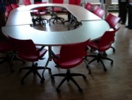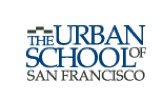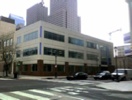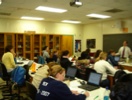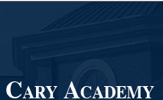November 26, 2007.
Attending Workshop the session is on the Finer Points of Web 2.0 by David Warlick.
Next to me is Carrie Willamson and Julie Williams.
Topics to discuss are: Podcasting, wikis, Virtual Reality, Blogs, Social Networking Virtual Learning, Social Networking
Handouts at: http://handouts.davidwarlick.com
Wiki Notes: http://web2atncetc.wikispaces.com/
Tools: Twitter and Ajax Chat Open-Source Ajax Chat that we can install on a server.
Podcasting: Audacity, Castblaster [ Garageband or Ubercaster (Mac Only)]
Sounds Effects: Partners in Rhyme is a good Royalty free sound effects.
For more on podcasting notes: see http://web2atncetc.wikispaces.com/podcasting as I became the note taker for podcasting.
Wikis:
The two best free sources are: wikispaces or pbwiki. Both are free and can be password protected.
Example of wikis from David
Have a scribe post notes of the day from class
Work with colleagues to brainstorm ideas.
Virtual Reality/ Multi User Virtual Environment – Teen Second Life
How does information storage change when you can organize Suriawang Daptop is David in Second Life
Edu Island is for educators in Second Life. Discovery Education Network has an island as does ISTE.
Common Craft does a great job on showing what a wiki is and how it is useful.
Blogs:
Software: epals.com, gaggle.net, imbee.com, and 21classes.com
Tools: Clustrmaps.com – get tracking on your blog Technorati.com tracks blogs and ranks them by number of folks who link to the blog.
Aggregators for RSS: Bloglines or Google Reader. The following 2 sites are more then an aggregator and can be used as a starting page for your browser. NetVibes.com, PageFlakes.com Most of these tools can be embedded into a Moodle course or blog.
Social Media:
Flickr/creativecommons for photos that are able to be used in schools.
Flickr.com/photos/tags/map to get photographs that were tagged as maps
Blogpulse: This will allow you to bring in via RSS any blog entry that has been written with the tags
Hitchhikr.com is a list of conferences that will be happening or in one month or so forth.
Virtual Learning and Social Networks:
Facebook.com
Mahara.org – Open Source eportfolio and social networks
Information Literacy
4 E’s based on the 3 R’s
The ability to expose the truth, can you employ the information, writing becomes can you express it completely so your communication contains all forms of communication. The last E is ethics on the use of technology and information. Ethics should be taught starting in grades one and continued along the entire course of school.
School in 5 Years: Or where we need to be in “Warlick’s World”
Every child has a computer under their arm
The computer will look a lot like a touch sensitive device about the size of a monitor, keyboards will be in the classrooms
There will be LCDs and SMARTboards
The walls will be SMART so electronic paper will be on the walls so digital content will be on the wall and called up by the teacher (8 to 10 years)
Every teacher has 3 or 4 hours of Professional Planning Time each day – to be a 21st Century Teacher, teachers must have this time to stay up to date
Students can be online using their personal learning network 4 hours a day and with their instructor taking place the other 3 or 4 hours of the normal school day
Libraries became not just a place for the consumption but a place to work the information. Sort of a Kinko’s for Kids. Students work with the information to filter it, add to it, or in other ways massage it.
Textbooks are no longer needed – embedded and digital. Discussion boards could be embedded inside of the textbook or as a learning platform in itself.
Virtual Learning is huge and teachers could be in cubicles and not in a classroom.
Pedagogy is dead as it works on developing strategies to teach about a limited amount of content.
We have about 5 years to determine what kind of questions do we ask when students have Google in their pocket? They should have Google in their pocket.

